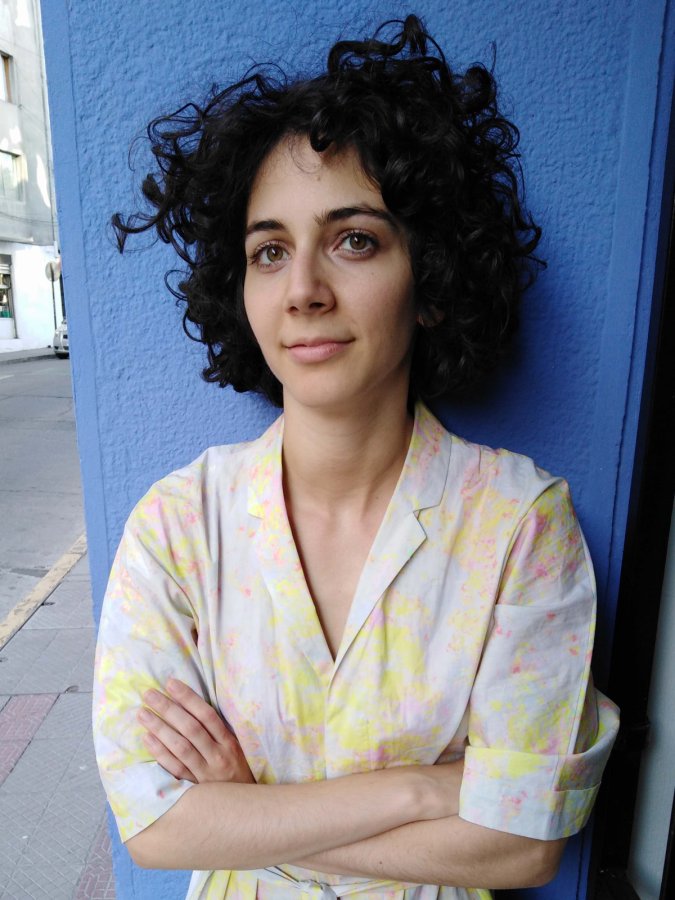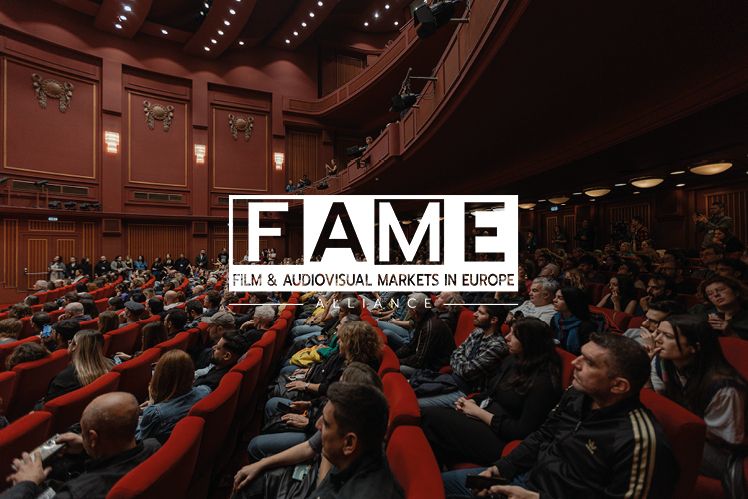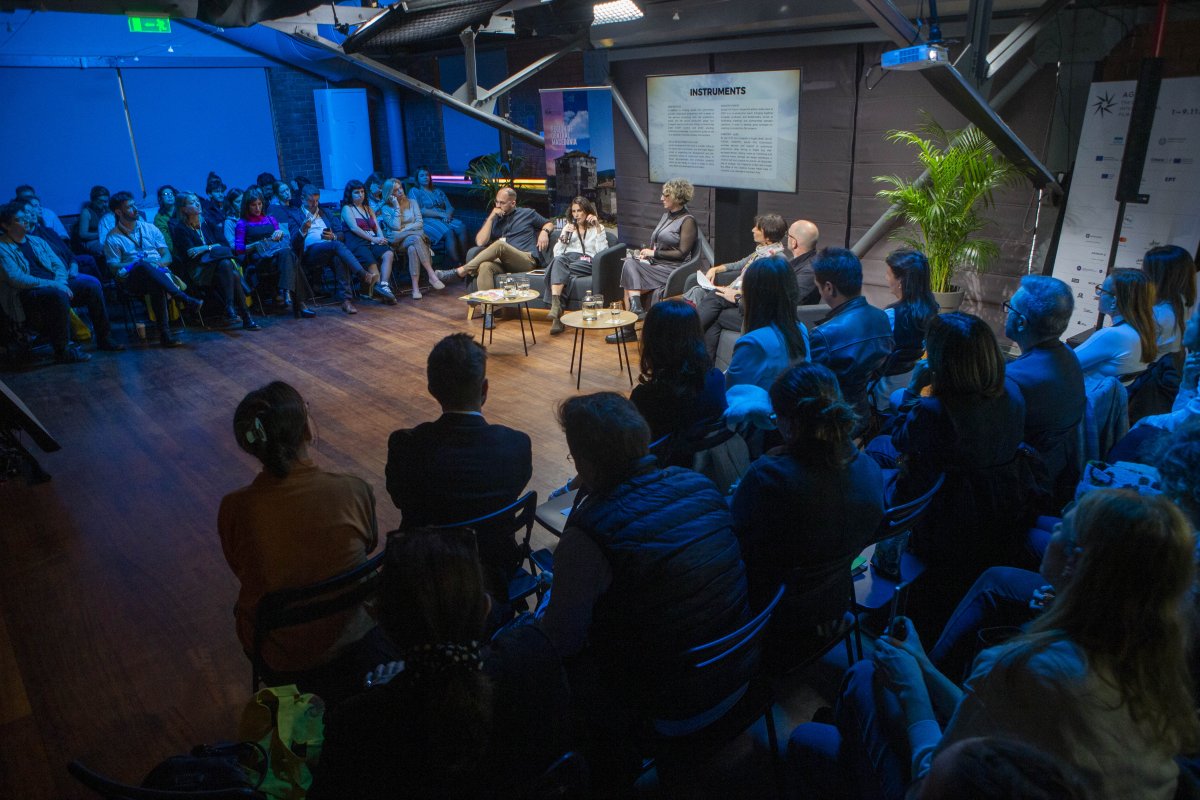19th Thessaloniki Documentary Festival
3-12 March 2017
JUST TALKING
FRIDAY 10/3
3-12 March 2017
JUST TALKING
FRIDAY 10/3
The “Just Talking” section of the 19th Thessaloniki Documentary Festival continued on Friday, March 10th 2017, at the “Room with a view” Cafe of the Olympion Complex. The discussion, moderated by TIFF’s Head of Programming Yorgos Krassakopoulos, was attended by directors Margarita Manda (Alki’s Long Walk), Benthe Forrer (The Chocolate Case), Frankie Fenton (It’s not Yet Dark), Robert Kirchhoff (A Hole in the Head), Christos Karalias (Ichthys), Angelos Kovotsos (String-less) and Mohamed Siam (Whose Country?).
The panel discussion began with a short presentation of the directors’ films.
Margarita Manda said that her film is a type of biography of Alki Zei, who is a very well-known writer in Greece and abroad, but also the story of the Greek Left in the 20th century, since Alki Zei’s life is strongly associated with it. For her part, Benthe Forrer noted that she had worked for years on the issue of children working as slaves in African cocoa plantations, gathering archive material and producing a TV show. Later on, she and her colleagues went on to create a chocolate which happens to be the most popular brand in the Netherlands today; the first chocolate which is not a product of slavery.
The topic of Frankie Fenton’s film is the story of Irish director Simon Fitzmaurice, who was diagnosed with amyotrophic lateral sclerosis (ALS) at the age of 34, a while after his first short film premiered at the Sundance Film Festival and while his wife was pregnant with their third child. Many years later he completed his first feature film, using software that analyses his eye movement, and also wrote his autobiography. In his film, Robert Kirchhoff wanted to document a piece of History, the Holocaust, as he described it, of the Romani people during World War II, having the protagonists of those events narrate them today. Christos Karalias’ film Ichthys began as a student project for his film school. The director said that, while doing the research, they discovered the family which eventually became the documentary’s topic.
Angelos Kovotsos met the all-female band Stringless three years ago in Athens and decided to make a film about them; a film which is less about their music and more about the identity, problems and daily life of women. As for Mohamed Siam, his documentary about the Egyptian police is quite special, being the only one in the Arab-speaking world to have a policeman as a protagonist.
How did they know they had a story that was worth to be told?
Robert Kirchhoff met the survivors, recorded their testimonies and then wrote the script. As he noted, many of those participating in the film talked about their experiences for the first time, which is something he considers essential since, if none of those who witnessed an historic event ever talks about it, then it’s as if it never happened. Christos Karalias began the research for his documentary having a totally different topic in mind; cosplay. Based on this, in the meantime he met the eldest son of the family on which the film focuses. When he met the family members he realised that it was quite an unusual case and decided that it had to become the topic of his documentary.
When he met Stringless, Angelos Kovotsos’ first impression was that, although they form a group, they have quite different, powerful personalities, come from different ethnic backgrounds and their first priority is not their external appearance; all of this attracted his interest. As Benthe Forrer explained, ten years after the launch of the slave-free chocolate, she was asked to make a documentary about this very topic, so that the public would be reminded that this product is indeed very special, something that had been forgotten, since it had already become one of the most popular chocolate brands in the Netherlands. As for Margarita Manda, she was offered a proposal-gift, as she called it, by three friends, the directors Petros Sevastikoglou, son of Alki Zei, Stella Theodoraki and Thanos Anastopoulos, to make this documentary about the writer, whom she knew only through her books. When they met, a very warm relationship was developed and they began shooting the film right away.
How important is it for them to feel connected to the theme and people they are filming?
“Whenever I start working on something, I know that I will be preoccupied with it for the next two or three years; it is therefore important that it’s something I really like”, said Benthe Forrer. Frankie Fenton agreed, adding that he’s been working on another project about the environment and nuclear energy for seven years now, because this is a topic that really interests him. For Christos Karalias, it is generally important to have a connection, but it was a little bit more complicated with this specific film because it’s two different things to have someone who is polite to you and to agree with their views. That’s why they tried to keep a balance in the way the topic was presented in the film, but still, an honest interest will always manifest itself in the result. Angelos Kovotsos referred to the issue of what happens after the completion of the film with regard to the relationships developed during the filming. He explaining that a void is created and that he feels guilty, that he has exploited the people he filmed. “The friendship that develops during the shooting can become an obstacle in the editing process”, said Benthe Forrer, while, for Margarita Manda, there is a difference between honesty and truth. As she explained, “you are more honest towards your protagonist if you don’t show the whole truth, because what you are doing a film and not a reality-show”.
Did their protagonists watch the films? And, if yes, what was their response?
Margarita Manda said that, for a documentary focusing on people like the one she made for Alki Zei, it is important that the protagonists get to watch themselves, even if they disagree. For this film, however, the director was particularly stressed because it was a great responsibility to make a film on such an important writer, but fortunately Alki Zei liked it. Frankie Fenton faced a different challenge since his hero, who is very well-known in Ireland as a writer and director, used some extreme expressions when referring to the Health Service of his country, expressions he insisted should be included in the film. That never happened, however, since there was a risk that it could cause legal reactions; eventually, the film is more a love story of the couple, which they actually liked and were moved by it, said the director, so they almost forgot they wanted the more “angry” bits to be included in the film. Christos Karalias made a comparison regarding this specific issue: “Imagine you are tagged in a photo on Facebook; you look at it and you feel that this can’t be you. Now imagine this but in greater length, with sound, your whole life in film. It’s strange, but it must happen. The protagonists watched the film in advance, so that they wouldn’t have any objections, and also because some members of the family who are minors participated in it; in the end, they had no objection. As for “String-less”, two deaths and two births in the protagonists’ wider circle occurred during the shooting. Some scenes, which were largely about the death of one of the protagonists’ husband, troubled Angelos Kovotsos the most; however, despite the pressure, they didn’t show the film to the protagonists before the film’s official public screening. This resulted in the protagonists viewing themselves in a different way, but they all agreed that it was a good artistic result.















